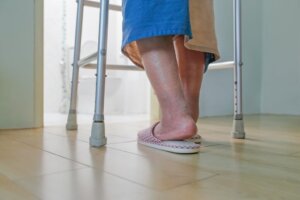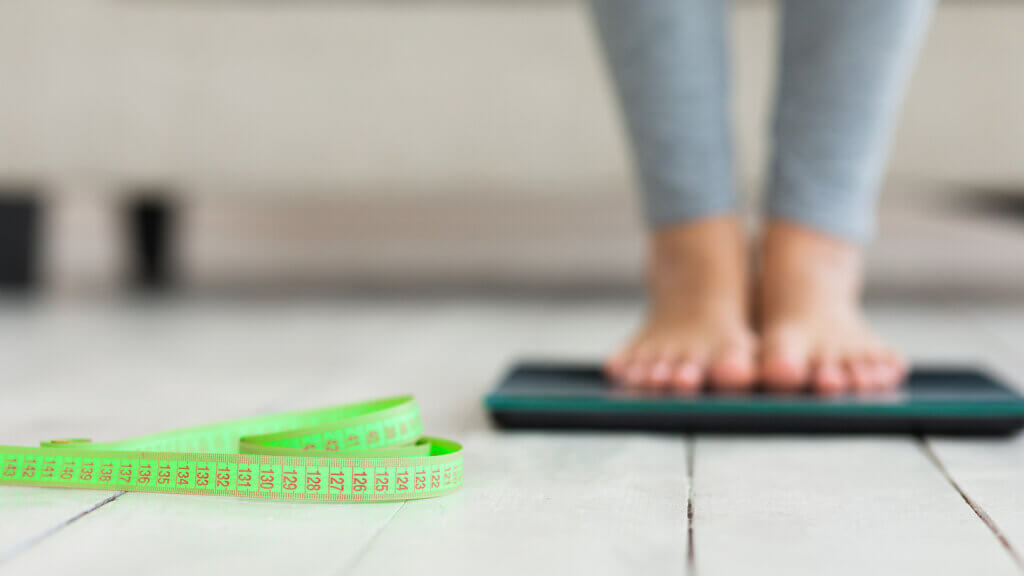Fluid Retention: Why Does It Happen?

Fluid retention is a very common problem. It occurs due to changes in the body in an attempt to maintain the balance of liquids. Its main symptoms are swelling in the legs, discomfort and an increase in stomach size. There are many causes of this condition, although today we’re going to focus on five of the most common ones.
Much of the body is made up of water, between 60% and 70% in fact. For example, 80% of the blood is made up of water, while the percentage drops to 70% when it comes to the brain. We’ve compiled 5 causes of fluid retention based on scientific evidence.
Main causes of fluid retention
Fluid retention can be a consequence of lifestyle or a symptom of an underlying disease. Some episodes are temporary, while others are postponed for months or years.
1. A sedentary lifestyle
As experts warn, a sedentary lifestyle is related to diseases of the musculoskeletal system, chronic venous insufficiency, deep vein thrombosis, obesity, cardiovascular problems, and lower limb edema.
This is the perfect recipe for the body to retain liquids, and a sedentary life is among its main causes.
Those who have a sedentary job, such as typical office work, frequently develop fluid retention as a consequence. Including physical activity on a regular basis, establishing breaks to stretch your feet and walk, as well as using compression stockings, can be of great help in this regard. Very long flights can also influence this problem.
2. Excess weight and obesity

The relationship between excess weight and obesity with fluid retention has been known for decades. Experts indicate that this is a consequence that can be overlooked, since it can be easily confused with excess kilos of fat.
It is a metabolic consequence, but also related to other causes of this condition, such as high sodium intake. As we’ll see shortly, food is considered a catalyst for the problem.
3. Hormonal changes
Different hormonal disturbances can cause fluid retention. Although they’re very varied, we’re going to highlight three of the most important:
- Thyroid problems: Fluid retention is a common symptom of thyroid problems. In fact, and as the specialists point out, the increase in body weight in disorders of the thyroid gland is due more to fluid retention than an increase in fat mass. It’s a more common sequel in hypothyroidism.
- Menopause: Researchers note that female hormones (estrogen and progesterone) contribute to the regulation of body fluids, cardiovascular function, and blood pressure responses to sodium loads. It’s for this reason that menopause is one of the main causes of fluid retention.
- Cushing’s disease: Edema has been classified as one of the most characteristic symptoms of Cushing’s disease. One form of the syndrome is caused by a benign tumor in the pituitary gland. As a result, it produces too much adrenocorticotropic hormone, which in turn causes the adrenal glands to make too much cortisol.
Since natural aging is related to a drop in hormonal levels, fluid retention can arise as a consequence
4. Medication intake

There is evidence that drugs such as antidepressants, hypertensives, anxiolytics, antihyperglycemics, antipsychotics, and corticosteroids can cause fluid retention.
In principle, this occurs after long-term treatments; but those in the short and medium term can also lead to it. Medicines used for cancer can also cause it.
5. Too much sodium intake
Another of the most common causes of fluid retention is the intake of too much sodium. This relationship isn’t disputed by researchers, so diet is a direct catalyst for this problem.
Nowadays, almost all foods contain a significant percentage of salt, and so many episodes of fluid retention can be explained in this way. For reference, the FDA recommends an average of 2,300 milligrams of sodium per day.
These aren’t the only causes, as heart disease, kidney disorders, pregnancy, vascular disorders, malnutrition, allergies, and deep vein thrombosis can explain many episodes. The exact cause can only be determined by a specialist after a diagnostic process.
Some lifestyle changes can control the amount of fluid retained in the body. For example, reducing your intake of table salt, engaging in regular physical activity, and avoiding a sedentary lifestyle. If the problem persists, don’t hesitate to seek professional help, as it’s likely to be an underlying disorder.
Fluid retention is a very common problem. It occurs due to changes in the body in an attempt to maintain the balance of liquids. Its main symptoms are swelling in the legs, discomfort and an increase in stomach size. There are many causes of this condition, although today we’re going to focus on five of the most common ones.
Much of the body is made up of water, between 60% and 70% in fact. For example, 80% of the blood is made up of water, while the percentage drops to 70% when it comes to the brain. We’ve compiled 5 causes of fluid retention based on scientific evidence.
Main causes of fluid retention
Fluid retention can be a consequence of lifestyle or a symptom of an underlying disease. Some episodes are temporary, while others are postponed for months or years.
1. A sedentary lifestyle
As experts warn, a sedentary lifestyle is related to diseases of the musculoskeletal system, chronic venous insufficiency, deep vein thrombosis, obesity, cardiovascular problems, and lower limb edema.
This is the perfect recipe for the body to retain liquids, and a sedentary life is among its main causes.
Those who have a sedentary job, such as typical office work, frequently develop fluid retention as a consequence. Including physical activity on a regular basis, establishing breaks to stretch your feet and walk, as well as using compression stockings, can be of great help in this regard. Very long flights can also influence this problem.
2. Excess weight and obesity

The relationship between excess weight and obesity with fluid retention has been known for decades. Experts indicate that this is a consequence that can be overlooked, since it can be easily confused with excess kilos of fat.
It is a metabolic consequence, but also related to other causes of this condition, such as high sodium intake. As we’ll see shortly, food is considered a catalyst for the problem.
3. Hormonal changes
Different hormonal disturbances can cause fluid retention. Although they’re very varied, we’re going to highlight three of the most important:
- Thyroid problems: Fluid retention is a common symptom of thyroid problems. In fact, and as the specialists point out, the increase in body weight in disorders of the thyroid gland is due more to fluid retention than an increase in fat mass. It’s a more common sequel in hypothyroidism.
- Menopause: Researchers note that female hormones (estrogen and progesterone) contribute to the regulation of body fluids, cardiovascular function, and blood pressure responses to sodium loads. It’s for this reason that menopause is one of the main causes of fluid retention.
- Cushing’s disease: Edema has been classified as one of the most characteristic symptoms of Cushing’s disease. One form of the syndrome is caused by a benign tumor in the pituitary gland. As a result, it produces too much adrenocorticotropic hormone, which in turn causes the adrenal glands to make too much cortisol.
Since natural aging is related to a drop in hormonal levels, fluid retention can arise as a consequence
4. Medication intake

There is evidence that drugs such as antidepressants, hypertensives, anxiolytics, antihyperglycemics, antipsychotics, and corticosteroids can cause fluid retention.
In principle, this occurs after long-term treatments; but those in the short and medium term can also lead to it. Medicines used for cancer can also cause it.
5. Too much sodium intake
Another of the most common causes of fluid retention is the intake of too much sodium. This relationship isn’t disputed by researchers, so diet is a direct catalyst for this problem.
Nowadays, almost all foods contain a significant percentage of salt, and so many episodes of fluid retention can be explained in this way. For reference, the FDA recommends an average of 2,300 milligrams of sodium per day.
These aren’t the only causes, as heart disease, kidney disorders, pregnancy, vascular disorders, malnutrition, allergies, and deep vein thrombosis can explain many episodes. The exact cause can only be determined by a specialist after a diagnostic process.
Some lifestyle changes can control the amount of fluid retained in the body. For example, reducing your intake of table salt, engaging in regular physical activity, and avoiding a sedentary lifestyle. If the problem persists, don’t hesitate to seek professional help, as it’s likely to be an underlying disorder.
- BANSI HW, OLSEN JM. Water retention in obesity. Acta Endocrinol (Copenh). 1959 Sep;32:113-22.
- Puga AM, Lopez-Oliva S, Trives C, Partearroyo T, Varela-Moreiras G. Effects of Drugs and Excipients on Hydration Status. Nutrients. 2019;11(3):669. Published 2019 Mar 20.
- Ong HS, Sze CW, Koh TW, Coppack SW. How 40 kilograms of fluid retention can be overlooked: two case reports. Cases J. 2009;2(1):33.
- Rakova N, Kitada K, Lerchl K, et al. Increased salt consumption induces body water conservation and decreases fluid intake. J Clin Invest. 2017;127(5):1932-1943.
- Ríos-Prego M, Anibarro L, Sánchez-Sobrino P. Relationship between thyroid dysfunction and body weight: a not so evident paradigm. Int J Gen Med. 2019;12:299-304. Published 2019 Aug 23.
- Sharma ST, Nieman LK. Cushing’s syndrome: all variants, detection, and treatment. Endocrinol Metab Clin North Am. 2011;40(2):379-ix.
- Stachenfeld NS. Hormonal changes during menopause and the impact on fluid regulation. Reprod Sci. 2014;21(5):555-561.
- Sudoł-Szopińska I. Wpływ długotrwałej pracy w pozycji siedzaicej na powstawanie obrzików kończyn dolnych i metody ich zapobiegania [Influence of prolonged sedentary work on the development of lower limbs edema and methods of its prevention]. Med Pr. 2006;57(3):263-9.
Este texto se ofrece únicamente con propósitos informativos y no reemplaza la consulta con un profesional. Ante dudas, consulta a tu especialista.







